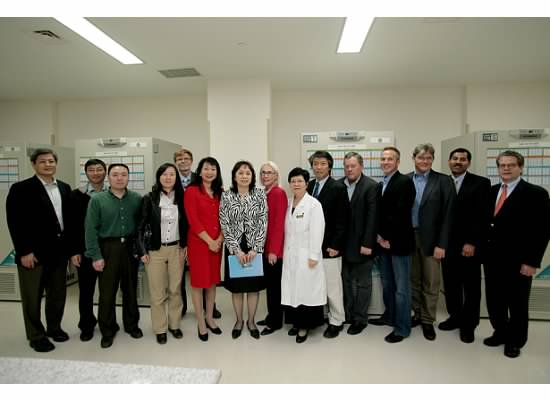
Years of AFCR Funding: 2013 to 2016
Integrating international resources to promote collaboration and accelerate cancer research
Xi-Shan Hao, MD,
Webster Cavenee, Ph.D
Overview
The current era of cancer genetics calls for new strategies and new tools for a more effective, personalized treatment approach against cancer. Promising new treatments rely on identifying the molecular profile of each patient’s cancer and exploiting vulnerabilities imparted by the underlying genetics. This “pharmacogenomic” approach allows doctors to choose the optimal therapy that will be most effective and least toxic for each patient. Such targeted cancer therapies are the future direction of cancer treatment.
The success of this new approach to cancer treatment depends upon having high-quality biospecimen (cancer tissue or blood samples collected from patients) for screening, monitoring, and research, so that findings at the bench can be translated into therapeutic regimens for the patient.
In this way, tumor biospecimen can be considered the center of the molecular-medicine universe. However, a lack of access to high quality cancer tissues remains a major obstacle to researchers around the world.
Working in partnership with the National Foundation for Cancer Research (our partner organization in the U.S.), AFCR has been actively participating in building the Tissue Bank Consortium in Asia (TBCA) since 2007 to overcome this key road block to cancer research. TBCA is a collaboration platform that provides access to high quality cancer tissues to researchers around the world and facilitates biospecimen-based international cancer research collaboration. The flagship member tissue bank of TBCA is the Joint Tissue Banking Facility established by NFCR and Tianjin Medical University Cancer Institute and Hospital, which collects and stores high quality cancer tissues with annotated clinical information.
Approach
1. The China-US Joint Workshop on Tissue Bank Standardization and Research Collaboration
In 2011, the National Cancer Institute (NCI) – the largest component of the National Institutes of Health (NIH) in the US and a world leader in cancer research, co-organized with NFCR a joint workshop on developing common standards for biorepositories and biospecimen research. AFCR was a proud sponsor of this impactful event. This is a symbol of recognition, by the international cancer research community, of our vision and approach to accelerating biospecimen-based research for personalized medicine. More than 200 oncologists, pathologists, physicians and cancer researchers from the United States, Singapore, Vietnam, Japan and China attended the joint workshop, creating a powerful international network of collaboration on biospecimen-based cancer research.
2. Multi-Party Collaborative Project: Geographical Mapping of Gastric Cancer Genomics
Recently, TBCA has successfully led a leading-edge research project which performs geographical mapping of gastric cancer genomics using the “next generation” genomic profiling technology.
Gastric cancer is the fourth most common cancer and the second leading cause of cancer death worldwide. It is particularly prevalent in the Asian countries such as China, Japan, South Korea, and Singapore. This cancer is so deadly that less than 3 out of every 10 patients survive longer than 5 years after diagnosis.
The TBCA-initiated international collaborative project, which involves 10 public and private partners in both U.S. and China, is aimed to identify genes that are responsible for gastric cancer and its metastasis. Using gastric cancer tissues provided by TBCA, the project will also identify biomarkers that could be useful both for gastric cancer diagnosis and in the development of new targeted therapies.
Impact
To date, researchers have sequenced 80 cases to search for the most common mutations in gastric cancer, and performed targeted sequencing on more than 200 additional cases for data validation. A special team of experts led by AFCR scientist Prof. Wei Zhang, who is also the Director of the NFCR Center for Cancer Systems Informatics at M.D. Anderson Cancer Center in the U.S., analyzed the data and compared them with data gathered from previous studies of other ethnic groups to gain insights into ethnicity-related molecular and genetic events in gastric cancer. The team has already obtained several exciting novel findings and is expecting to publish these novel results in a high profile cancer journal.
The success of the gastric cancer collaborative project underscores that our long-term efforts in building an international-standard biorepository and collaboration platform through the Tissue Bank Consortium in Asia is bearing fruits now. It also sets up a new model, which is both productive and cost-effective, for public-private partnership and academia-industry collaboration in cancer research across geographic boundaries.
Continued research collaboration on gastric cancer and other types of cancer in the future will lead to improved cancer classification, personalized therapy regimen, early diagnostic tests, and more effective cancer therapies. AFCR’s effort in establishing the Tumor Tissue Bank and the Tissue Bank Consortium fosters more research breakthroughs and could benefit millions of cancer patients around the world.
Click here to learn more about the gastric cancer research project that TBCA and AFCR are working together.

